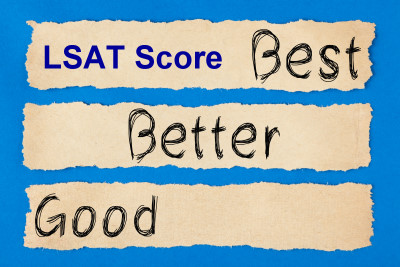What's a Good LSAT Score?

August 15, 2025
If you're studying for the LSAT, you've more than likely been asking the question: What's a good LSAT score? That's only natural, as you want to perform at your best on this important exam with the goal of being admitted to your dream law school. With all the studying you're doing, you don't want to focus obsessively on achieving a certain number. However, it's vital to know what goes into a stellar score and what makes a good one—well, good!
While there's no magic number or answer, there are factors that contribute to evaluating your LSAT score that we can dissect, such as how scoring works, test taker and school percentiles, and the overall role of the exam in the law school application process.
You're pursuing a rigorous LSAT course of study, so you deserve to know all you can about what makes a good score. Read on and take note—you just may learn something new about this crucial test!
LSAT Scoring at Glance
It's important to understand the basics of LSAT scoring before delving into specifics about what makes a good score. The number of questions you answer correctly on the exam is your raw score. All questions count the same and no points are deducted for wrong answers. This number is converted to a scaled score, which is the official score you receive. Below are some basic numbers to keep in mind:
- 120: lowest possible LSAT score
- 180: highest possible LSAT score
- 1 point: scaled score increments
- 152: average LSAT score
LSAT Percentiles
To understand how law school acceptances work, you need to be familiar with percentiles. Your LSAT score's percentile, which will appear on your score report, is the percentage of test takers who scored lower than you on the exam over the previous three years. For instance, an 80th percentile score means you did better than 80 percent of test takers. Percentiles allow schools to determine how your score compares to other applicants. Below is a LSAT percentile table for 2021-2024, which shows how scores and percentiles match up:
| Scaled Score | Percentile |
| 180 | 99.9% |
| 179 | 99.8% |
| 178 | 99.7% |
| 177 | 99.5% |
| 176 | 99.3% |
| 175 | 99.0% |
| 174 | 98.7% |
| 173 | 98.1% |
| 172 | 97.5% |
| 171 | 96.7% |
| 170 | 95.7% |
| 169 | 94.5% |
| 168 | 93.1% |
| 167 | 91.5% |
| 166 | 89.8% |
| 165 | 87.8% |
| 164 | 85.6% |
| 163 | 83.1% |
| 162 | 80.5% |
| 161 | 77.6% |
| 160 | 74.6% |
| 159 | 71.6% |
| 158 | 68.1% |
| 157 | 64.7% |
| 156 | 61.1% |
| 155 | 57.5% |
| 154 | 53.9% |
| 153 | 50.0% |
Percentiles can also be a great way to determine what type of score you need to be admitted to the law schools where you plan to apply. Each school has their own LSAT percentiles for the most recent first-year class. For example, if your LSAT score is in the 75th percentile for a certain school, that means you performed better than 75% of that school's latest first-year class. If you scored in the school's 25th percentile, you only did better than 25% of the class. Below is a table showing the 25th to 75th percentile range and overall acceptance rate for the top law schools in the U.S.
(Note: If your target law schools aren't listed, visit their websites. LSAT percentiles and acceptance rates are typically published publicly for prospective students.)
| LAW SCHOOL | LSAT Score 25th-75th Percentile Range (2024) | Acceptance Rate (2024) |
| Harvard | 171-176 | 11.0% |
| Yale | 170-177 | 5.4% |
| Columbia | 170-175 | 11.8% |
| Stanford | 169-175 | 8.9% |
| University of Chicago | 169-175 | 12.7% |
| NYU | 169-173 | 16.7% |
| University of Pennsylvania | 168-174 | 10.0% |
| Duke | 168-171 | 13.9% |
| Berkeley | 167-172 | 17.3% |
| Northwestern | 166-174 | 15.4% |
The Takeaway
Determining what makes an LSAT score good depends on your own goals for an optimal number, and what accepted students at the law schools you plan to apply to have scored. Kellye Testy, former president and CEO of LSAC, explained, "As far as an LSAT score to aim for in order to be competitive for admission to law school, it really does depend on the particular school and how competitive it is. In general, anyone who scores in the high 160s and 170s are usually considered very competitive."
Study and preparation will help you achieve a top LSAT score that will put you in a higher percentile. But remember that your score is only part of the overall package you will send to law schools. You will also be submitting admission essays, letters of recommendation, your GPA, and school transcripts, presenting a rounded, complete picture for schools to evaluate.
Regardless of your school goals, you want to devise a course of study for the LSAT that leaves you ample time to fully understand all the vital exam strategies so you can achieve your best performance.
